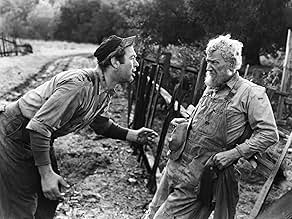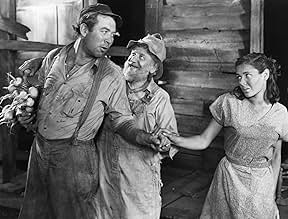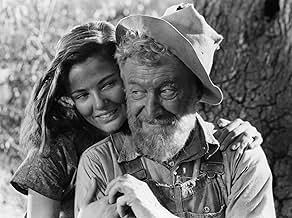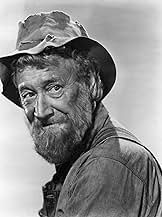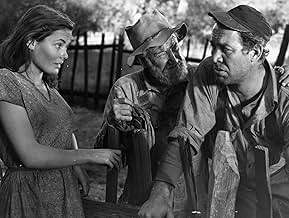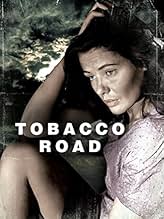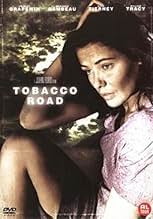IMDb-BEWERTUNG
6,4/10
2671
IHRE BEWERTUNG
Füge eine Handlung in deiner Sprache hinzuHillbilly family farm life in 1941 rural Georgia.Hillbilly family farm life in 1941 rural Georgia.Hillbilly family farm life in 1941 rural Georgia.
- Regie
- Drehbuch
- Hauptbesetzung
- Auszeichnungen
- 2 wins total
Dorothy Adams
- Payne's Secretary
- (Nicht genannt)
Erville Alderson
- Driver of Car Almost Hit by Dude Lester
- (Nicht genannt)
Empfohlene Bewertungen
It's hard to even understand why TOBACCO ROAD was such a long-running success on the Broadway stage. Fox has taken the play, cut all of the more sizzling elements that made it intriguing, and reduced it to a tale of dirt poor farm folk too shiftless to make a living off the land with the accent on comedy rather than focusing on a few of the more poignant moments.
It's certainly a disappointment to find Dana Andrews and Gene Tierney totally wasted in small roles early in their careers at Fox. Tierney, especially, has little to do but say a few lines and look as unscrubbed as possible. It's really an embarrassment to watch her in this role.
Overacting is in abundance, particularly from William Tracy as the imbecilic son, Dude, who is crazy from start to finish (with Ward Bond delivering him a well-deserved punch at the finale). Marjorie Rambeau as a gospel-singing fanatic overacts too and even Ward Bond is irritating at times.
But in the central role of the shiftless farmer who spends the whole story trying to devise ways to save his land with a $100 down payment, Charlie Grapewin gives a fine, nuanced performance, slipping easily from comedy to drama without a strain. Elizabeth Patterson tries to give some dignity to the role of his equally downtrodden wife.
John Ford's uninspired direction is largely responsible for the lackluster overall impact of the film, based on the play taken from an earthy Erskine Caldwell novel. Whatever elements made the play so enormously successful have been eliminated in Nunnally Johnson's screenplay.
Summing up: A huge disappointment on many levels although it contains some striking B&W photography.
It's certainly a disappointment to find Dana Andrews and Gene Tierney totally wasted in small roles early in their careers at Fox. Tierney, especially, has little to do but say a few lines and look as unscrubbed as possible. It's really an embarrassment to watch her in this role.
Overacting is in abundance, particularly from William Tracy as the imbecilic son, Dude, who is crazy from start to finish (with Ward Bond delivering him a well-deserved punch at the finale). Marjorie Rambeau as a gospel-singing fanatic overacts too and even Ward Bond is irritating at times.
But in the central role of the shiftless farmer who spends the whole story trying to devise ways to save his land with a $100 down payment, Charlie Grapewin gives a fine, nuanced performance, slipping easily from comedy to drama without a strain. Elizabeth Patterson tries to give some dignity to the role of his equally downtrodden wife.
John Ford's uninspired direction is largely responsible for the lackluster overall impact of the film, based on the play taken from an earthy Erskine Caldwell novel. Whatever elements made the play so enormously successful have been eliminated in Nunnally Johnson's screenplay.
Summing up: A huge disappointment on many levels although it contains some striking B&W photography.
When John Ford filmed "Tobacco Road" in 1941 the play was still running on Broadway. It opened in 1933 and even today only "Life with Father" has had a longer run for a non-musical production. It was based on Erskine Caldwell's risque novel about dirt-poor Southern farmers and after his success with "The Grapes of Wrath" Ford might have seemed like a fairly obvious choice for the film version but Caldwell was not Steinbeck and this was no "Grapes of Wrath".
It's tolerable enough but Charley Grapewin's old codger Jeeter, a supporting character now given centre screen, gets on your nerves very quickly. In fact, everyone in this picture gets on your nerves very quickly, (they are all portrayed as greedy imbeciles). William Tracy is terrible as the son and a youthful Gene Tierney, (it was only her second film), is totally miscast as sex-pot Ellie May. If Marjorie Rambeau is a little less grating as Sister Bessie it's perhaps because she, at least, is trying to underplay her part and only the great Elizabeth Patterson comes out of this with any dignity. In other words, it's certainly nobody's finest hour, (except perhaps cinematographer Arthur Miller), and Ford's least of all. The only real surprise about it is how it was ever a hit in the first place.
It's tolerable enough but Charley Grapewin's old codger Jeeter, a supporting character now given centre screen, gets on your nerves very quickly. In fact, everyone in this picture gets on your nerves very quickly, (they are all portrayed as greedy imbeciles). William Tracy is terrible as the son and a youthful Gene Tierney, (it was only her second film), is totally miscast as sex-pot Ellie May. If Marjorie Rambeau is a little less grating as Sister Bessie it's perhaps because she, at least, is trying to underplay her part and only the great Elizabeth Patterson comes out of this with any dignity. In other words, it's certainly nobody's finest hour, (except perhaps cinematographer Arthur Miller), and Ford's least of all. The only real surprise about it is how it was ever a hit in the first place.
Tobacco Road as was written by Erskine Caldwell and dramatized on Broadway for 8 years was brought to the screen by 20th Century Fox in a considerably altered state. It was thought of probably by Darryl Zanuck as a great property for John Ford seeing what he did with The Grapes Of Wrath.
The Grapes Of Wrath by John Steinbeck is a great piece of social commentary, an immortal work whether in print or on the big or small screen. Ford kept the spirit of Steinbeck's work completely intact and got a well deserved Best Director Oscar. In this one because Caldwell's Jeeters are not quite as noble as the Joads of The Grapes Of Wrath, they're not prototype rural proletarians. The changes took a lot of the drama and commentary and left the film not too far above the Weaver Family films and Ma and Pa Kettle.
Charley Grapewin and Bessie Patterson are Mr.&Mrs. Jeeter Lester and Jeeter is a guy determined to get by doing as little as possible. The whole family has his spirit. He's married most of his children off. One of the daughters in serious trouble of being an old maid at 23 and that was Gene Tierney if you can believe that. Her character in the book and play has a cleft palate and you can understand why she's not married off. Here she's just gorgeous Gene Tierney and a crucial element is missing.
There's another daughter Pearl whom we never see, but who's married to the loutish Ward Bond. She keeps running off and Bond just doesn't get it. Here he's just rustic lout, I suspect that the 13 year old Pearl figures she can do a whole lot better. That one I'm sure the Code was breathing hot and heavy over 20th Century Fox.
There's another physically deformed character and that's Marjorie Rambeau who has in the book a nose like a pig's snout. Grapewin palms off his 16 year old son as a new husband for Rambeau to get his hands on the insurance money her old husband left her. William Tracy as the kid who's no prize figures she's experienced and eager even if she's a psalm singer which she is.
The rough house comedy that typifies many a Ford film is funny, but hardly in the spirit of what Caldwell was writing. In the end I have to say that the film is not good John Ford, though he's done worse.
The Grapes Of Wrath by John Steinbeck is a great piece of social commentary, an immortal work whether in print or on the big or small screen. Ford kept the spirit of Steinbeck's work completely intact and got a well deserved Best Director Oscar. In this one because Caldwell's Jeeters are not quite as noble as the Joads of The Grapes Of Wrath, they're not prototype rural proletarians. The changes took a lot of the drama and commentary and left the film not too far above the Weaver Family films and Ma and Pa Kettle.
Charley Grapewin and Bessie Patterson are Mr.&Mrs. Jeeter Lester and Jeeter is a guy determined to get by doing as little as possible. The whole family has his spirit. He's married most of his children off. One of the daughters in serious trouble of being an old maid at 23 and that was Gene Tierney if you can believe that. Her character in the book and play has a cleft palate and you can understand why she's not married off. Here she's just gorgeous Gene Tierney and a crucial element is missing.
There's another daughter Pearl whom we never see, but who's married to the loutish Ward Bond. She keeps running off and Bond just doesn't get it. Here he's just rustic lout, I suspect that the 13 year old Pearl figures she can do a whole lot better. That one I'm sure the Code was breathing hot and heavy over 20th Century Fox.
There's another physically deformed character and that's Marjorie Rambeau who has in the book a nose like a pig's snout. Grapewin palms off his 16 year old son as a new husband for Rambeau to get his hands on the insurance money her old husband left her. William Tracy as the kid who's no prize figures she's experienced and eager even if she's a psalm singer which she is.
The rough house comedy that typifies many a Ford film is funny, but hardly in the spirit of what Caldwell was writing. In the end I have to say that the film is not good John Ford, though he's done worse.
Dirt poor, elderly Georgia farmer Jeeter Lester (Charley Grapewin) schemes to get some money so that he and his wife Ada (Elizabeth Patterson) can remain at their dilapidated frame house on Tobacco Road, in this Great Depression era story, part comedy, part drama.
As country hicks, most of the characters are rather too stereotyped to be realistic. The film's script is very talky, not surprising since the story originated as a stage play. The film's plot varies wildly from slapstick comedy to morose drama. And therein lies the main problem.
Rural poverty in the South during the 1930s was no laughing matter. It was an intensely painful and prolonged episode of human misery. I can understand how viewers in those days needed some comic relief, but not in a story about poverty. The hyper-antics of young Dude, the film's comic relief, are extremely annoying. Those scenes dilute the seriousness of the film's underlying theme. And the subplot wherein Dude and Sister Bessie go off together seems like plot filler.
Charley Grapewin gives a fine performance in the lead role. But Marjorie Rambeau as Sister Bessie, and William Tracy as Dude overact. Part of this overacting could have been the result of poor film direction.
The film's background music runs the gamut from frivolous and nondescript in the comedic scenes to old-time gospel songs like "Shall We Gather At The River" during more serious moments.
Given the era in which the film was made, "Tobacco Road" is okay, if you give it some slack. But the story would have been better without the slapstick comedy. In any event, it's a good movie to watch when you're depressed and think things can't get much worse.
As country hicks, most of the characters are rather too stereotyped to be realistic. The film's script is very talky, not surprising since the story originated as a stage play. The film's plot varies wildly from slapstick comedy to morose drama. And therein lies the main problem.
Rural poverty in the South during the 1930s was no laughing matter. It was an intensely painful and prolonged episode of human misery. I can understand how viewers in those days needed some comic relief, but not in a story about poverty. The hyper-antics of young Dude, the film's comic relief, are extremely annoying. Those scenes dilute the seriousness of the film's underlying theme. And the subplot wherein Dude and Sister Bessie go off together seems like plot filler.
Charley Grapewin gives a fine performance in the lead role. But Marjorie Rambeau as Sister Bessie, and William Tracy as Dude overact. Part of this overacting could have been the result of poor film direction.
The film's background music runs the gamut from frivolous and nondescript in the comedic scenes to old-time gospel songs like "Shall We Gather At The River" during more serious moments.
Given the era in which the film was made, "Tobacco Road" is okay, if you give it some slack. But the story would have been better without the slapstick comedy. In any event, it's a good movie to watch when you're depressed and think things can't get much worse.
This movie is quite popular in certain circles but I guess I'm just not the biggest fan of John Ford's his straight-forward drama's.
Even though this movie is a comedy it still is a movie that is driven by its drama, characters and emotions. But problem is, I just wasn't very taken by any of its drama, characters or emotions. The entire movie and the way it plays out with its story, dialog and characters, feels very stagy. No wonder, since it also actually got based on a popular stage play by Jack Kirkland. But in my opinion a stage-play rarely translates well on to the silver-screen.
I can't really say that this is an horrible movie to watch, since it also made me laugh a couple of times and it does has its moments but overall the movie feels far too distant and stagy and besides starts to annoy after a while.
The movie features a family of hillbillies, who are all extreme stereotypes and do some beyond stupid and crazy things, that will just never happen in real life. It's also reason why the movie feels really distant and so do all of the characters and their emotions.
I could take Charley Grapewin's hillbilly performance for half an hour or so but after that I soon became tired of it. I have seen him before in several movies and it seems that he made his career out of playing this sort of clueless hillbilly characters. His performance and especially accent always sort of annoyed me but not bad enough to make me hate him, since he was also always playing more supporting type of roles, rather than the main character. In this movie however he is the main character, so no big surprise that I got annoyed by him pretty fast.
A John Ford you can really easily do without.
6/10
http://bobafett1138.blogspot.com/
Even though this movie is a comedy it still is a movie that is driven by its drama, characters and emotions. But problem is, I just wasn't very taken by any of its drama, characters or emotions. The entire movie and the way it plays out with its story, dialog and characters, feels very stagy. No wonder, since it also actually got based on a popular stage play by Jack Kirkland. But in my opinion a stage-play rarely translates well on to the silver-screen.
I can't really say that this is an horrible movie to watch, since it also made me laugh a couple of times and it does has its moments but overall the movie feels far too distant and stagy and besides starts to annoy after a while.
The movie features a family of hillbillies, who are all extreme stereotypes and do some beyond stupid and crazy things, that will just never happen in real life. It's also reason why the movie feels really distant and so do all of the characters and their emotions.
I could take Charley Grapewin's hillbilly performance for half an hour or so but after that I soon became tired of it. I have seen him before in several movies and it seems that he made his career out of playing this sort of clueless hillbilly characters. His performance and especially accent always sort of annoyed me but not bad enough to make me hate him, since he was also always playing more supporting type of roles, rather than the main character. In this movie however he is the main character, so no big surprise that I got annoyed by him pretty fast.
A John Ford you can really easily do without.
6/10
http://bobafett1138.blogspot.com/
Wusstest du schon
- WissenswertesWalter Brennan turned down the lead role because he disapproved of the character's laziness.
- PatzerWhen the new car is tipped over, after being driven on dirt roads and through mud, the underside is spotless.
- Crazy CreditsOpening and some of the closing credits are presented written in real sand.
- VerbindungenReferenced in Fräulein Mama (1942)
- SoundtracksDixie's Land
(uncredited)
Written by Daniel Decatur Emmett
[Variations often played as background music]
Top-Auswahl
Melde dich zum Bewerten an und greife auf die Watchlist für personalisierte Empfehlungen zu.
- How long is Tobacco Road?Powered by Alexa
Details
Box Office
- Weltweiter Bruttoertrag
- 534 $
- Laufzeit1 Stunde 24 Minuten
- Farbe
- Seitenverhältnis
- 1.37 : 1
Zu dieser Seite beitragen
Bearbeitung vorschlagen oder fehlenden Inhalt hinzufügen


